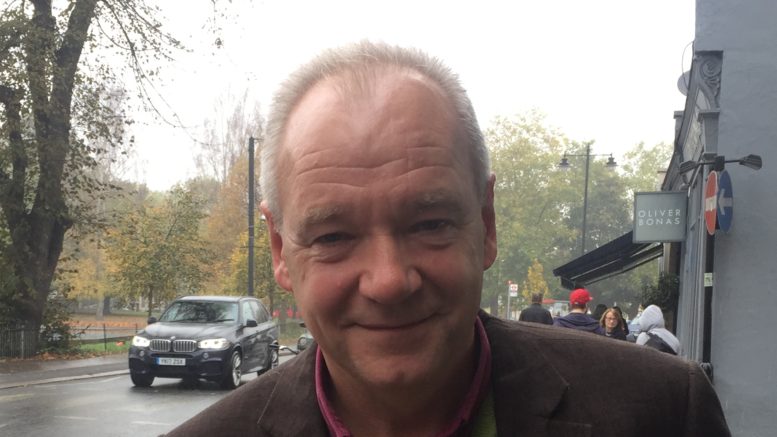There are few British comedy writers who are as prolific as John O’Farrell. Having spent years writing for Spitting Image and Have I Got News For You, he turned his hand to writing comic novels and non-fiction, penning the acclaimed film Chicken Run as well. A new Aardman animation he worked on, Early Man, is out in January.
We met the 55-year-old at a French café in Clapham and asked him about his new book, a humorous political memoir called Things can only get worse? which takes us from the dawn of New Labour in 1997, where his last memoir ended, to the present day.
“I actually spent about a year mulling over a different sort of political book to write and then Brexit happened. It seemed like a sort of story which I’d never written before, one without a happy ending – going from triumph to disaster”, he says.
A life-long Labour supporter and campaigner, O’Farrell has twice stood for parliament as a Labour candidate. He lost to Theresa May in Maidenhead in 2001.
“I finished the book and I was ready to send it off to proof it and everything. Then Theresa May came outside Downing Street that week and went ‘there’s going to be a general election’. I had to ring up my editor and go ‘We can’t publish this because Labour’s going to get wiped out’ and then that would be the end of the story.
“So we held off publication and then the election flipped and went the other way! All my novels have a surprise twist and a happy ending so, thanks Theresa May! She gave me the surprise twist.”
Life in local politics over the last two decades has not always been easy, but O’Farrell tackles serious, tricky issues with lashings of humour. We wonder if people need humour in politics nowadays to stay sane.
“Up to a point, but not to the stage of being Foreign Secretary”, he quips.
“What I’ve done is to personalise the political and try to present difficult things with a sugar-coating of gags. And it just makes people engage with the national picture in their own lives.”
O’Farrell started his comedy career on the now-defunct Weekending, a topical comedy show on Radio 4, before going on to write on Spitting Image and Have I Got News For You.
He has had more experience of writing comedy at the top level than most, but he sounds unconvinced that satire can truly make a positive difference in politics.
“It’s useful and necessary, and it’s better than blood in the streets. But it engenders a sort of sofa-based voter apathy. You know, ‘I’m gonna laugh at them, I’m above it’, rather than ‘I’ve got to get in there and sort this out’.”
O’Farrell spent five years writing on HIGNFY in the 1990s and appeared on the show a few times as a contestant after he had left. But, perhaps surprisingly, he questions how beneficial HIGNFY and shows like it really are for our democracy.
“It makes you feel sort of mockingly superior to the politicians instead of angrily powerless. So I think that creates a different dynamic and makes us just be able to cope with all the awful things that are going on here because we’ve had a laugh.”
O’Farrell also believes HIGNFY has played a role in legitimising political figures who should have been more closely scrutinised. Boris Johnson, for instance, would not have achieved as much without the platform the show gave him, he says.
These are striking criticisms from one of the country’s leading satirists, and potentially dispiriting for anyone who is hopeful of the power of this kind of comedy.
“I think decades of doing it has sort of taught me of its impotency. When Peter Cook set up The Establishment Club he said his model was the 1930s German Cabaret which did such a great job of stopping Adolf Hitler. He was aware that it’s a release valve, not an engine for change.”
O’Farrell starts to grin broadly, “A release valve, not an engine for change. That’s a good phrase that!”
When we talk about Spitting Image however, his tune slightly changes and he is more willing to point to examples of the impact the show did have on politics. The long-running show famously portrayed Liberal Party leader David Steel stuffed into the pocket of David Owen, the founder of the Social Democratic Party.
“They were supposed to be joint leaders of the Liberal-SDP alliance but Owen was a former British foreign secretary with a big ego, so Spitting Image constantly portrayed him as superior. And when they lost the ‘87 election I think David Steel actually presented himself to the public quite aggressively because of the way Spitting Image had perceived him, so that imploded the alliance much quicker.”
The program ran from 1984-1996 and reeled in millions of viewers. O’Farrell talks about it warmly, and credits it with diminishing the deference people felt towards politicians. But he thinks that this might have gone too far.
“We have contempt for politicians before they’ve opened their mouth which is not a very helpful state for democracy either.”
Where does this leave satire then? O’Farrell says he predicted there would be another satire boom when David Cameron came to power, but it failed to materialise. “I wonder if it’s because it’s just no big shakes now to say politicians are useless”, he suggests.
Is satire dead then? Suddenly, O’Farrell strikes a hopeful note.
“It might be that we’re short of one creative mind, one brilliant person to say ‘Ah, this is the way to do satire right now.’ But it does need someone to step up and do it.”



